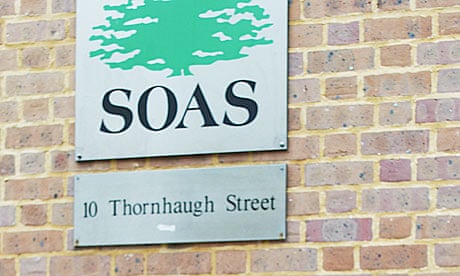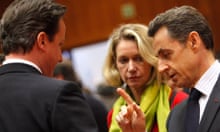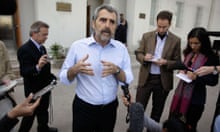Potentially embarrassing new details of links between the Gaddafi regime and British universities have emerged, including revelations that one of the Libyan dictator's sons was tutored in the UK.
Mutassim Gaddafi, who has been described as a "war criminal" by Libyan anti-government protesters, was given private lessons at the School of Oriental and African Studies in the summer of 2006. Four years later Soas, which is part of the University of London, announced a lucrative deal with a Libyan university [see footnote].
It has also emerged that another British university formed a partnership with a Libyan government ministry to reform the country's prisons. But the university did not gain access to Libya's two most notorious jails.
The deal with the centre for prison studies at King's College London was facilitated by the Gaddafi foundation, the charity run by another of the dictator's sons, Saif al-Islam. The foundation also made a controversial £1.5m donation to the London School of Economics.
The prisons project received funding from both governments. According to a conference paper on the programme published by two staff at the centre, the Gaddafi foundation "created the essential links that made the project a reality".
Universities have come under increasing pressure in recent days over Libyan links. Sir Howard Davies, the LSE's director, resigned last week over accepting the Gaddafi donation and the university announced an independent inquiry.
Robert Halfon, Conservative MP for Harlow, called for an independent inquiry into the last government's Libyan links. He said in the Commons on Monday that British universities' links with Libya "were facilitated by the last government and... the fish rots from the head down".
Gaddafi's fourth son, Mutassim, 34, attended an English course at Soas. His studies were organised by Sue Yates, then Soas's director of business development. She said: "The young man was just there for four weeks maximum. His family, or whoever it was who arranged it, felt that this young man should do some work [on] the sophistication in his language use. This is not unusual at all for members of prominent families. "It was special tuition for someone from a high profie background."
Subsequently, Soas signed a £188,024 agreement with al-Fateh university in Tripoli in 2010 to teach an MSc in finance, though a Soas spokesman said the links predated Mutassim's course. Mutassim is now believed to run a special forces unit [see footnote].
It has also emerged that staff from the centre for prison studies at King's College London visited Libyan jails and found "a clear overall improvement" in prisons run by the judicial police, who they helped train in awareness of human rights.
But the project did not include the Abu Salim and Ain Zara prisons, which are used to detain political prisoners, who are held for years without trial. According to Human Rights Watch, "Libyan prisons still contain hundreds of political prisoners who have not engaged in violent acts or advocated violence. Many of those imprisoned in Abu Salim belong to Islamist groups. Although some have advocated violence, many have not and none have received fair trials."
Professor Andrew Coyle, director of the prison studies centre, which has recently moved from King's to Essex University, said: "Always when we work in problematic countries one of the first questions we ask is, are these people serious about change, or are we simply a figleaf for a regime? They were serious about reform, and one of the first indications of this was that they accepted the suggestion that the prisons system should move from the ministry of public security to the ministry of justice." International human rights standards required that prisons should be run separately from the interior ministry, Coyle said.
He said the funding for all the centre's activities came from the Foreign Office, and was worth £680,000 over six years, while the Libyan government funded Libyan officials' involvement.
The centre went to Libya at the invitation of the Foreign Office, he added.
The King's connection is an illustration of the moral complexities of engaging with the Gaddafi regime. While the Gaddafi foundation helped set it up, it involved improving standards in prisons run by Mostafa Abdeljelil, the minister of justice, who was praised at the time by human rights campaigners and has subsequently been identified as a provisional leader of Libyan cities under rebel control. The project was due to conclude in February this year.
Coyle said: "In many countries in the world we have had to make difficult decisions and on this occasion we made the decision that the benefits of working in all the ministry of justice prisons outweighed the disadvantages of not having access to [Abu Salim and Ain Zara] prisons."
The spotlight on academia prompted a statement from Liverpool John Moores University on Monday in which it listed Libyan connections involving its business school, health faculty and a course on neonatal care for which it received £14,000.
This footnote was appended on 15 March 2011: SOAS has asked us to point out that academic links with the al-Fateh university began in 2002 and that Mutassim Gaddafi played no part in establishing the academic collaboration that led to the funding, worth £188,024, of the MSc in finance in 2010.










